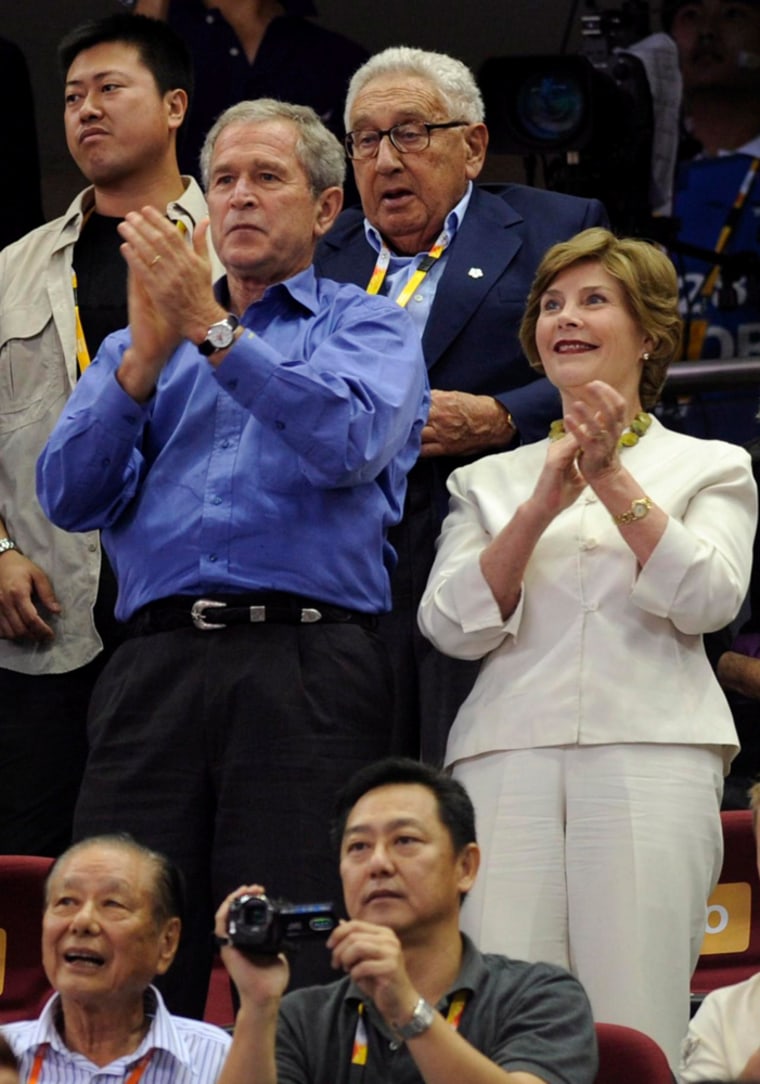The Olympics hadn't even started when Russian Prime Minister Vladimir Putin quietly confirmed to U.S. President George W. Bush the sketchy reports of Russian troops involved in an outbreak of fighting in Georgia's breakaway republic of South Ossetia.
Suddenly, the president found the celebratory message of what is likely to be his last trip to Asia overshadowed by a growing crisis that could easily spread in a volatile region rife with ethnic tensions. His Beijing itinerary went on as planned, but the behind-the-scenes machinations over what to do about the conflict took center stage for the traveling White House.
Bush was positioned right in the middle, between a small U.S. ally and powerful Russia.
"It was just interesting to me that here we are, trying to promote peace and harmony, and we're witnessing a conflict take place," Bush recalled Monday before wrapping up his weeklong, three-country swing and heading home.
Bush's goals while visiting South Korea, Thailand and China were to cheer on U.S. athletes and outline his vision for the future of American policy in Asia. On the doorsteps of repressive regimes in North Korea and Myanmar, he pressed for human rights improvements.
Focus turns to Georgia
Despite being told by China not to interfere in its internal affairs, he used his time in Beijing to push the communist government to give its people greater freedom of religion and speech, offering praise for its economic reforms as balance while touting his presence at the Olympics as evidence of the respect he held for the Chinese people.
But the focus increasingly tightened on Georgia. There was talk of war and ethnic cleansing. Bombs and tanks were pounding areas well away from the original conflict zone.
Even as Putin rushed home Saturday to manage his military, the sports-loving Bush refused to let the fighting completely ruin his trip as the first sitting American president to attend an Olympics on foreign soil. He gave pep talks to U.S. athletes, posed for photos with them — which he later called the best part of the trip — and then was their biggest fan.
In between watching Michael Phelps win two gold medals, taking a spin on the Olympic mountain biking course and visiting the U.S. beach volleyball, softball and baseball teams, the president got regular updates on the deteriorating situation in Georgia.
Heading home, Bush pressed Russia to halt its retaliation against Georgia for trying to take control of South Ossetia.
'It must not stand'
In an interview Monday with NBC Sports, Bush criticized the violence, calling it unacceptable and Russia's response disproportionate.
"I've expressed my grave concern about the disproportionate response of Russia and that we strongly condemn the bombing outside of South Ossetia," Bush said. He said he did so directly to Putin at a reception for world leaders Friday and subsequently by phone to Russian President Dmitri Medvedev.
"I was very firm with Vladimir Putin," Bush said. "Hopefully this will get resolved peacefully."
U.S. Vice President Dick Cheney told Georgia's pro-American president that "Russian aggression must not go unanswered, and that its continuation would have serious consequences for its relations with the United States," Cheney's office reported Sunday.
Asked to explain Cheney's phrase "must not go unanswered," White House spokesman Gordon Johndroe said, "It means it must not stand."
The U.S. military irked Putin when it began flying 2,000 Georgian troops home from Iraq after Georgia recalled them. The decision was a timely payback for the former Soviet republic, which was the third-largest contributor of coalition forces in Iraq after the U.S. and Britain.
The risk of the conflict setting off a wider war increased when Russian-supported separatists in another breakaway region of Georgia, Abkhazia, launched air and artillery strikes on Georgian troops to drive them out of a small part of the province they control.
